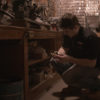Film School & Education | Reports
The First Step to Becoming a Filmmaker
Written by Olga Elizabeth Peters | Posted by: Anonymous
You dream of something different than your 9-5, punch-the-clock job. You want to open your own restaurant, write that novel, drive across country in a VW van, become a singer, or perhaps, make movies.
Make movies! What? Are we crazy?
Probably, but that’s besides the point. The real question is: how? Well, there’s always film school, but that will most likely entail relocating and paying thousands of dollars in tuition. So, the Boston Film and Video Foundation came up with an alternative — one that happens to be cost-effective and, if you’re living in New England, a reasonable commute.
When BFVF Education Director Laura Wilson looked into other film programs, she found that most traditional workshops being offered focused on teaching separate aspects of filmmaking, but didn’t give you the whole experience of making a film. So, she decided to create a program at BFVF that would teach "real world filmmaking" in its entirety.
The name Fusion was not chose by chance. The final hope of these workshops is to unite a group of students into a collaborating team. Imagine, you’ve got this fantastic script that you want to make into a film, and you’ve decided to direct it. You still need actors, a director of photography, a production manager, an art department, etc. When you’re in the Fusion Workshops, you can call on your classmates.
"[We] want to build or rebuild an independent film community with vitality and cooperation," says Richard Broadman, who along with Rob Todd, teaches the Fusion workshops.
Most of the classes are held at night and on weekends. "The workshops were designed with working people in mind," says Wilson. The students come from all walks of life – a computer analyst, single mom, undergraduates, a carpenter and a baker, to name a few.
Film Workshops
International Film & TV Workshops in Maine
The Film Center in Boston (617-266-3003)
"I always wanted a career in film, but didn’t know how, so I put it off. This is a last ditch effort," says Eric Vonlaudermann about his choice to join the Fusion Workshops. At this point, Eric’s primary interests are in writing and special effects.
For Jennifer Kietzman, who has done some screenwriting and camera work, "[The workshops] seemed like an immediate hands-on and monetarily accessible option." Eric and Jennifer are examples of students who are taking their first steps toward their realized dream of filmmaking. Other students, like Robin Masi, whose background is in art, now has a film project in the works. She is now utilizing the skills she has learned so far to turn her script into a film. "I think a team is starting," she says. "That’s their goal instead of working as an individual, like painting."
The Fusion Workshops in Film are designed in sections Fusion 1 and Fusion 2-6. Fusion 1 is made up of an orientation which teaches students the fundamentals of professional filmmaking: location scouting, budgeting, story boards, and camera work. There are guest lectures from professionals inside the movie industry, as well as excursions to local area film businesses. Richard and Laura feel the benefit of the guest speakers and trips are that they give the students the chance to learn from those working in the field. This handing down of experience in turn helps to reinforce the circular giving of the community that the workshops are building.
Fusion 2-6 are specialized sessions students sign up for in story development, screenwriting, film production, and art direction. All of these workshops are intended to teach the bigger picture of professional filmmaking, encompassing the creative process and the nitty-gritty nuts-and-bolts of everyday production life. Students who receive high evaluations in the 1-6 classes will be asked to apply for more advanced sessions the following fall. These courses will bring together a team of students who will work on a half hour, professional, low-budget film.
The motto of the Fusion workshops is best summed up as "education through experience." Equipped with knowledge, experience and a few connections, students "graduate" from the Fusion workshops ready to produce their own work.












